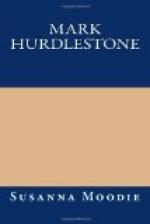Anthony shook his head. “Godfrey will never work.”
“Then, my dear sir, he must starve.”
“He will do neither.”
And the conversation between the friends terminated.
CHAPTER XIII.
The world has done its worst,
you need not heed
Its praise or censure now.—Your
name is held
In deep abhorrence by the
good: the bad
Make it a sad example for
fresh guilt.—S.M.
We will leave Anthony Hurdlestone to weep and watch beside the newly dead, and conduct our readers into the cottage occupied by Farmer Mathews and his family.
Returning the night before from market, very much the worse from liquor, the farmer had fallen from his horse, and received a very severe concussion of the brain. William, surprised at his long absence, left the house at daybreak in search of his father, and found him lying, apparently dead, within sight of his own door.
With Mary’s assistance, he carried him into the house. Medical aid was called in, and all had been done that man could do to alleviate the sufferings of the injured farmer, but with little effect. The man had received a mortal blow, and the doctor, when he left that evening, had pronounced the fatal sentence that his case was hopeless; that, in all probability, he would expire before the morning.
As the night drew on, the elder Mathews became quite unconscious of surrounding objects, and but for the quick hard breathing, you would have imagined him already dead.
The door of the cottage was open, to admit the fresh air; and in the door way, revealed by the solitary candle which burnt upon the little table by the bed-side, stood the tall athletic figure of William Mathews. His sister was sitting in a low chair by the bed’s head, her eyes fixed with a vacant stare upon the heavy features of the dying man.
“William,” she said, in a quick deep voice, “where are you? Do come and watch with me. I do not like to be alone.”
“You are not alone,” returned the ruffian sullenly; “I am here; and some one else is here whom you cannot see.”
“Whom do you mean?”
“The devil, to be sure,” responded her brother. “He is always near us; but never more near than in the hour of death and the day of judgment.”
“Good Lord, deliver us!” said the girl, repeating unconsciously aloud part of the liturgy of the Church to which nominally she belonged.
“All in good time,” responded the human fiend. “Has father shown any sign of returning sense since the morning?”
“No, he has remained just in the same state. William, will he die?”
“You may be sure of that, Mary. Living men never look as he does now.”
“It is a terrible sight,” said his sister. “I always did hope that I should die before father; but since I got into this trouble I have wished that he might never live to know it. That was sin, William. See how my wicked thoughts have become prophecy. Yet I am so glad that he never found out my crime, that it makes the tears dry in my eyes to see him thus.”




